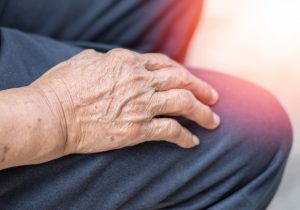
May is Arthritis Awareness Month: What you need to know
Arthritis can be a real sore spot for those who endure its pain every day. While this debilitating disease is often seen as a sign of aging, it can actually strike anyone, at any age and at any time at all. With more than 54 million Americans struggling with the soreness, stiffness, and swelling of arthritis, it’s the leading cause of disability in the country. But there’s no need for those affected to suffer in silence throughout the month of May because it’s officially recognized as Arthritis Awareness Month. Each May, everyone is encouraged to understand the impact of arthritis on the health and happiness of so many by discovering the various arthritis types and arthritis causes, along with the different arthritis symptoms and the most effective arthritis treatment. During Arthritis Awareness Month, learn about life with arthritis and ways to make it less of a pain.
What is arthritis?
Today, it seems like everyone knows someone who is suffering from arthritis. But rather than a single disease, arthritis is actually a general term for around 100 different conditions affecting the joints and the tissues surrounding the joints. Arthritis literally means inflammation of a joint, but that’s only one of the many sources and symptoms of the many chronic conditions called arthritis.
Several sorts of soreness
While there are more than 100 different health issues under the veil of arthritis, it’s important to know the most common arthritis types and how to determine the different disorders. The most prevalent arthritis types include:
- Osteoarthritis – Commonly called “wear-and-tear” arthritis, osteoarthritis is the most common kind. It’s known as a degenerative joint disease because it causes the cartilage protecting the joints to break down over time, which leads to stiffness, pain, swelling, and a decreased range of motion.
- Rheumatoid arthritis – This autoimmune disease occurs when the body’s immune system mistakenly attacks the healthy cells in your body, typically in the joints of your fingers, knuckles, wrists, elbows, hands, knees, and toes. This triggers inflammation in the lining of the joints, which leads to ongoing swelling and pain.
- Psoriatic arthritis – Another autoimmune disease, this condition resembles rheumatoid arthritis, but it also affects the skin. With psoriatic arthritis, the body’s immune system becomes overactive and starts to attack healthy tissues in the body. This leads to swelling and stiffness in the joints, along with red patches and silvery scales appearing on the skin.
- Fibromyalgia – This condition affects much more than your joints. Fibromyalgia causes pain all over the body, chronic fatigue, mood swings, memory loss, and emotional distress.
- Other types of arthritis include lupus, gout, and juvenile arthritis.
Causes for concern
Many people are well-aware that arthritis causes soreness, stiffness, and swelling—but what exactly causes arthritis? Depending on the particular type of arthritis, it can result from inflammation, wear-and-tear daily damage, infection, previous injury, lifestyle, or genetics.
Signs of suffering
As is the case with causes of arthritis, each condition has its own arthritis symptoms. Yet certain symptoms span the spectrum of frequent arthritis conditions, such as:
- Joint pain
- Soreness
- Swollen joints
- Stiffness both in and around the joints
- Decreased range of motion
- Redness of the skin
Realize your risk
The fact is that certain factors may raise your risk of developing arthritis, with some you can control and others you simply cannot. The issues that increase your risk are a family history of arthritis, advancing age, being overweight, unhealthy diet, previous joint injuries, lack of physical activity, and your gender since arthritis affects more women than men. Luckily, some simple lifestyle changes can lower your likelihood of developing arthritis, such as maintaining a healthy weight, improving your diet, and getting regular physical activity. Speak to your SignatureMD-affiliated doctor to learn ways to reduce your risk.
Remedies for relief
Are you aching to relieve your arthritis? While there is no known cure for arthritis, there are several kinds of arthritis treatment that can help you manage your symptoms and improve your quality of life. One of the easiest and most effective ways to manage arthritis is by simply staying active. See, regular physical activity can help reduce pain, increase your range of motion, and give your mood a boost. Select activities that are gentle on your joints to help you avoid any injuries or pain, such as walking, swimming, or biking. In addition, maintaining a healthy weight can help decrease excess stress on your joints and ease arthritis pain. Beyond these natural remedies, your SignatureMD-affiliated doctor may recommend medications, therapies, or surgeries to take away the ache.
Throughout Arthritis Awareness Month, spread the word about living with arthritis to raise awareness about prevention, coping behaviors, and moving toward a cure.